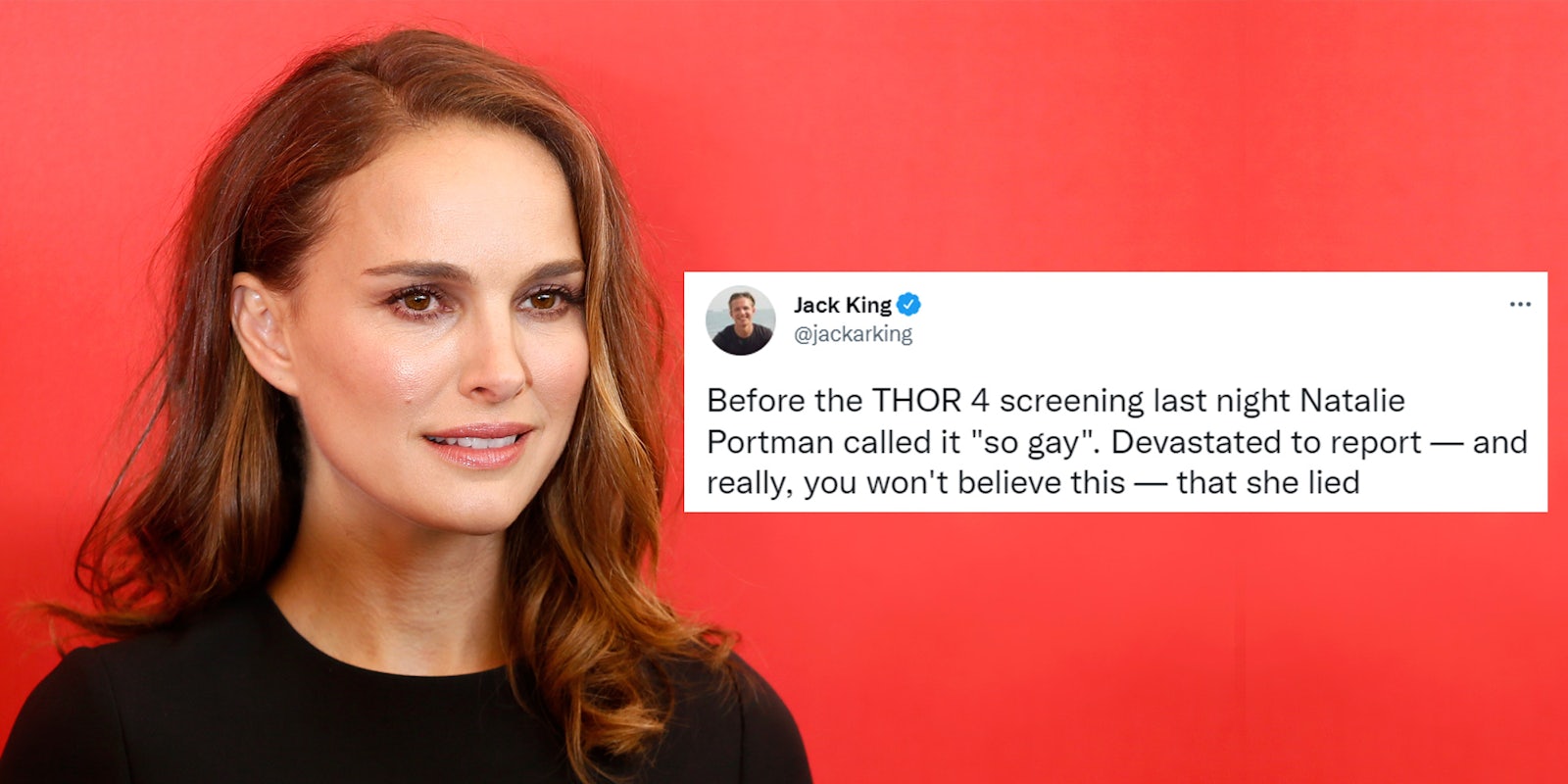Queer representation in the Marvel Cinematic Universe is pretty abysmal, even by Hollywood’s historically abysmal standards, limited mostly to characters like Loki in Loki, the unnamed man played by Joe Russo in Avengers: Endgame, Phastos and his husband Ben in Eternals, and America Chavez’ lesbian moms in Doctor Strange in the Multiverse of Madness. (You get a few more characters when looping in the Marvel Netflix shows, Agents of S.H.I.E.L.D., and Runaways.)
Thor: Love and Thunder officially added several characters to the incredibly short list, but the film’s queer representation is already being criticized by some fans not just for its execution, but also for how the film’s cast hyped how queer the film would be at a recent screening.
Ahead of Love and Thunder’s London premiere, someone in the audience asked writer-director Taika Waititi, who was on stage with stars Tessa Thompson and Natalie Portman, “How gay is the film?” Waititi pointed to Portman to handle the question, and she responded by telling them that it was “So gay.” Waititi echoed her sentiment, adding that it was “Super gay!” The audience went wild.
Watch on TikTok
Just how gay or queer Love and Thunder is, in reality, probably not as vast as Waititi or Portman seemed to suggest when hyping the film up for an enthusiastic crowd.
Warning: Minor spoilers for Thor: Love and Thunder to follow.
Thor: Ragnarok received criticism back in 2017 over reports that a scene confirming that Valkyrie (Thompson) was bisexual was cut. Thompson originally played Valkyrie as bisexual to reflect the character’s sexuality in the comics, and Waititi has expressed an interest in including an explicitly queer Valkyrie in the MCU; in 2019, Thompson even teased back in 2019 that post-Endgame, King Valkyrie “needs to find her queen.”
Love and Thunder officially makes Valkyrie bisexual. It does so in two blink-and-you’ll-miss-it scenes: In one, a reference is made to Valkyrie’s girlfriend, who died in a battle. In another scene, Valkyrie kisses the hand of another woman. The film also confirms that Korg (Waititi), the Kronan warrior who Thor (Chris Hemsworth) first meets in Ragnarok, is gay (another thread from the comics) and shows him with a husband and a kid. And that’s about it.
For some who heard Waititi and Portman’s insistence that Love and Thunder was very gay, the reality of the level of queerness in the film might come as a disappointment. Others might view the earlier proclamation as being a false advertisement from Waititi and Portman, who were attempting to hype up a movie they’re being paid to promote; technically, it’s a correct answer even if it might be an over-exaggeration.
Love and Thunder juggles an ensemble cast, and as Thompson told the Los Angeles Times, she didn’t want Valkyrie’s queerness to be the only thing about her character.
“We’ve had lots of conversations about [Valkyrie’s sexuality],” she explained. “I think there’s a lot of folks that are righteously very hungry for that representation to exist in these movies, as am I. But I also think [it’s important] not to hang the character’s hat solely on her sexual identity just because she’s a queer character. I think that’s one way of minimizing her humanity, actually, if that’s the only facet that you get to explore her in.”
After more than a decade of queerbaiting and panicking whenever fans latched onto those pairings as advertised, having more than one queer character casually woven into a film, particularly for a franchise that seems to have actively avoided it for as long as it possibly could, is an improvement. For an indication of how it was just a few years ago, look no further than how Marvel handled the end of Steve Rogers and Bucky Barnes’ story in Endgame.
But in 2022, given the complexity of queer stories being told now across TV and film—including one that Waititi portrays in Our Flag Means Death—blink-and-you-miss-it references to a character’s sexuality just won’t cut it anymore for people looking for any kind of meaningful representation in the things they watch.


 (@iarematthewc)
(@iarematthewc) 